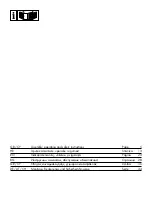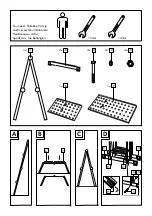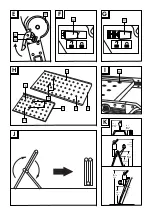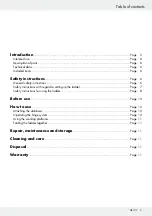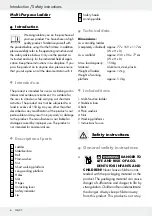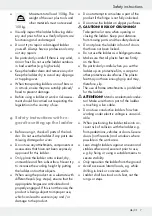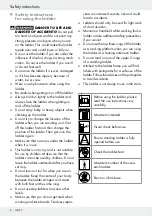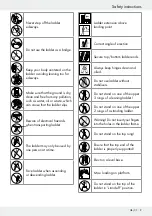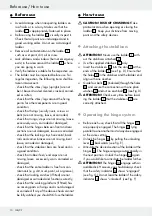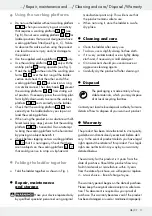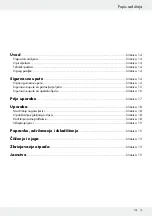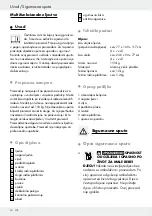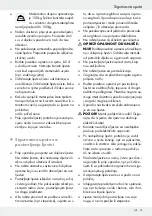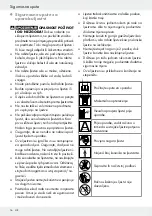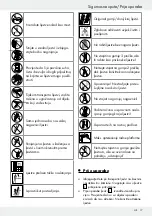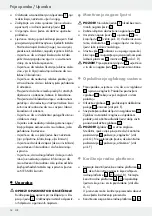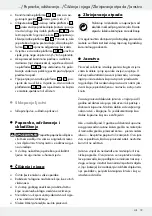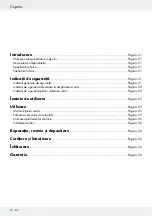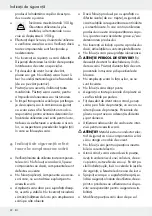
7
GB/CY
Safety instructions
J
150 kg
Maximum total load 150 kg. The
weight of the user plus tools and
other materials must not exceed
150 kg.
J
Visually inspect the ladder following deliv-
ery and prior to first use. Verify all parts are
functioning and undamaged.
J
Do not try to repair a damaged ladder
yourself. Always have a professional carry
out any repairs.
J
Be particularly careful if there is any wind,
rain or frost. Do not use the ladder outdoors
in bad weather (e.g. high winds).
J
Keep the ladder clean and remove any dirt.
Keep the ladder dry to avoid any slippage
or toppling over.
J
When transporting ladders on roof bars or
in a truck, ensure they are suitably placed /
fixed to prevent damage.
J
Before using a ladder at work a risk assess-
ment should be carried out respecting the
legislation in the country of use.
Q
Safety instructions with re-
gard to setting up the ladder
J
Before using it, check all parts of the lad-
der. Do not use the ladder if any parts are
missing, damaged or worn.
J
Do not use any attachments, components or
accessories that have not been expressly
approved for this ladder.
J
Only place the ladder onto a level, dry,
unmovable and firm subsurface. Never try
to increase the working height by putting
the ladder onto other objects.
J
When using the product on a substrate with
different levels (e.g. steps), ensure that the
appropriate hinges are articulated and
properly engaged. If this is not the case, the
product is being subject to improper use,
which can lead to severe injury and / or
damage to the product.
J
Do not attempt to articulate a part of the
product if the hinge is not fully unlocked.
J
Do not use the ladder on slippery surfaces.
CAUTION! RISK OF CRUSHING!
Take particular care when opening or
closing the ladder. Keep your distance
from moving parts and the safety devices.
J
Do not place the ladder in front of doors
that have not been locked.
J
Do not use the ladder as a bridging structure.
J
Make sure that all plastic feet are firmly
on the floor.
J
Be particularly careful when you set the
ladder up on protective film, a carpet or
other protective subsurfaces. The plastic
feet may not have enough grip and may,
therefore, slip.
J
The use of frame attachments is prohibited
for this ladder.
ATTENTION!
Metal is an electrical conduc-
tor! Make sure that no part of the ladder
is touching a live cable.
J
Do not use conductive ladders for when
working under electric voltage is unavoid-
able.
J
When positioning the ladder take into ac-
count risk of collision with the ladder e.g.
from pedestrians, vehicles or doors. Secure
doors (not fire exits) and windows where
possible in the work area.
J
Lean straight ladders against an even and
stable surface and secure it prior to use,
e.g. by fixing or using a suitable means to
secure stability.
J
Only reposition the ladder from the ground.
J
Avoid excessive lateral loads, e.g. while
drilling in brick or concrete walls.
J
Ladder shall be stood on its feet, not the
rungs or steps.
Summary of Contents for Profi+ 287991
Page 30: ...30 BG J 150kg 150kg 150kg J J J J J J J J J J J J J J J J J J J...
Page 31: ...31 BG J J J J J J J J J J J J J J J J J J J J 2 J J...
Page 32: ...32 BG 3 2...
Page 33: ...33 BG J 1 J 1 J 1 J 1 J J 1 1 2...
Page 35: ...35 BG J J J J J J 3 3...
Page 36: ...36 GR CY 37 37 37 37 37 37 37 38 39 41 42 42 42 42 43 43 43 43 43...
Page 38: ...38 GR CY J 150kg 150kg 150kg J J J J J J Q J J J J J J J J J J J...
Page 39: ...39 GR CY J J J J J J Q J J J J J J J J J J J J J J...
Page 40: ...40 GR CY J J 2 J J...
Page 41: ...41 GR CY 3 2 Q J 1 J 1 J 1 J 1 J J...
Page 43: ...43 GR CY Q J J Q J Q J J J J J Q 3 3 O 2251 1994...


